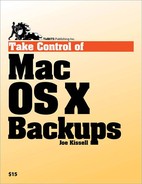I remember vividly the days of backing up my hard disk onto a tall stack of floppies. Back when a 40 MB drive was standard, I would have been thrilled to think I could put 16 or more copies of my disk on a single CD-R. A few years later, conventional wisdom held that DAT (digital audio tape) drives were the way to go for many power users. Now, however, with hard disk sizes routinely reaching 1 TB, we have to reconsider old notions about backup hardware and media. You probably have a lot of data to copy, and the amount will only increase. But you don't want to spend a fortune on your backup system, and you don't want backups to take all day. What to do?
In the pages that follow, I tell you which backup destinations you should consider, and which you should avoid:
Hard drives: External hard drives are ideal for both duplicates and archives. See "Hard Drives," below.
RAIDs: Hard drive arrays have some benefits, but may not be as useful as their manufacturers want you to believe. Read RAIDs.
Optical media: Although floppy disks are dead, optical (CD and DVD) drives are still common, and since you may have these already, you'll want to consider whether to use them for archives (though they can't be used for duplicates). Consult Optical Media.
Network storage devices: Gadgets that combine a hard drive with a network interface (including Apple's Time Capsule) are often sold as backup solutions. See Network Storage Devices.
Local and remote servers: Another computer on your local network—or across the world—could be a destination for your backups. See Local Network Servers and Internet Backup Services.
Everything else: Among the choices I can't recommend for most people are tape drives, flash drives, and Iomega's Zip, Jaz, and REV drives. Read Hardware You Shouldn't Consider and Why.
Let me begin with my favorite option: external hard drives. I use and suggest hard drives as a backup medium, and in almost every case I believe they're the best choice for individuals and small networks.
Note
It's nice outside: I deliberately said external hard drives—even though you could save some money on the enclosures and extra electronics by buying drives that can be mounted in your desktop Mac Pro or Power Mac. I advocate external drives because:
You can disconnect an external drive and store it off-site—an important safeguard against theft.
If your computer suffers severe damage due to a power surge, a leaky roof, or being knocked off the desk accidentally, your internal hard drives may fail along with the rest of the machine.
